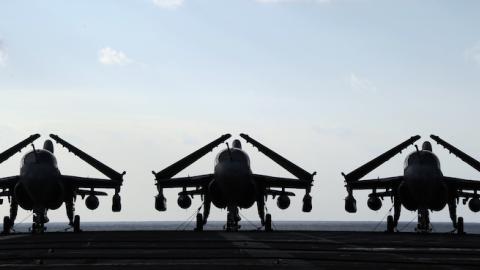During a hearing of the House Armed Services Committee last September, Representative Randy Forbes (R., Va.) posed two questions to the four chiefs of staff — Army, Navy, Air Force, and Marines: 1) Could you carry out military requirements under the latest Defense Strategic Guidance, assuming the ten-year budget cuts stay in effect? And: 2) Could you prevail in more than one regional conflict at the same time? One by one, the four chiefs replied to both questions: “No.”
The Army chief, General Raymond Odierno, elaborated: “In fact, it is my opinion that we would struggle to meet even one major contingency operation.” Unless we stop the diminution of military capability we’ve already suffered and reverse the decline, as General Odierno said elsewhere, “we may have to brutally accept more risk, where in the past we have reduced risk.”
Secretary of Defense Chuck Hagel put it even more bluntly in a February 2014 Pentagon press briefing: “We are entering an era where American dominance on the seas, in the skies, and in space can no longer be taken for granted.”
Thus, whether because federal budgets over the last several years have failed to maintain and develop U.S. military capabilities and readiness, or because our adversaries have steadily increased their expenditures and improved their own military capabilities and readiness, or both, the U.S. no longer enjoys the benefits of unquestioned global military preeminence.
This has dramatic consequences for the U.S. and for the world.
For the U.S., it means at the very least that when a U.S. interest is threatened and a successful military intervention would protect that interest, the questions before the president and other policymakers will be harder for them to answer honestly than in the days when U.S. military dominance could be taken for granted and the answer was closer to a firm “yes.” These questions are: Does our military have the resources and the readiness to succeed in the proposed intervention? Would deploying U.S. military forces subject them to greater risks than those for which we have prepared them? Might we lose? What would be the costs of losing, in blood, treasure, and political influence?
The consequences of diminished U.S. military capabilities relative to those of potential aggressors are different for adversaries and enemies than they are for friends and allies. However, one consequence is the same for all: Each country, in determining its course of action, will take into account the acknowledged decline in U.S. military power.
For an adversary or an enemy considering aggression to achieve a goal, it means that even if the U.S. might be inclined to assist the aggressor’s targeted victim, it will be less inclined than in the past, and the U.S. military will be less capable of opposing the planned aggression in any event. It is likely that China already has done this in stepping up its territorial claims, and its use of force to support those claims, in the South China Sea. It also is likely that the Islamists known as ISIS have been influenced by this evaluation in their bloody conquests of portions of Iraq and Syria and in declaring the existence of a caliphate in the conquered territory.
For a U.S. friend or ally to which the U.S. has a security commitment, the end of U.S. military dominance raises questions about whether the U.S. can, or will, make good on its commitment. Friends and allies that until recently depended on the support of the U.S. military to help protect them from threats are starting to realize that relying on U.S. protection may no longer be warranted. They are beginning to consider alternative means of addressing threats to their security. Recent policy steps of Japan, South Korea, and Germany are possible manifestations of this.
Secretary Hagel and the four chiefs of staff have acknowledged the diminution of U.S. military dominance. But U.S. officials mostly have been reluctant to acknowledge the consequences of that decline for protecting U.S. interests in specific circumstances.
One instance of an official’s candor about how our diminished military capabilities adversely affect policy occurred when Katrina McFarland, assistant secretary of defense for acquisition, said on March 4, 2014 — in the course of speaking at an Aviation Week conference — that due to cuts to the defense budget, the Pentagon’s plans to pivot to Asia “can’t happen.” She subsequently “clarified” her comments. The clarification was that the pivot is still happening but that budget constraints require us to “adapt, innovate, and make difficult (budgetary and acquisition) decisions to ensure that our military remains ready and capable.”
The Obama administration and some congressional leaders on both sides of the aisle are in denial about the fact that the end of military dominance means that our ability to pursue particular policies and actions has diminished. Some current U.S. policies are based on the expectation that our military can and will perform operations at which it has excelled in the past, even though we are no longer equipping and training it to do so. Claims that the U.S. will do “more with less” are preposterous. It is dangerous to pretend that we still have policies or can take actions requiring military resources that we provided in years past but don’t provide today.
What to do about the dramatically changed security situation we confront is something on which we should focus — with urgency. The U.S. is at a fork in the security road. We’ve come to this point by budgeting for defense on the basis of “what we can afford” and pretending that our ability to meet acknowledged threats has not changed. We must choose the path we want to take. Then we should equip our military to protect us as we proceed down that path.
Should we decide that the end “of American dominance on the seas, in the skies, and in space” may be acceptable, we must acknowledge that it necessarily means the U.S. will no longer be the global leader for security. Would that be in U.S. interests? Would the financial savings warrant it?
The end of U.S. global leadership for security raises a host of questions that are difficult to translate into dollars: What would it mean for U.S. security, for U.S. economic interests, and for the security interests of our friends and allies? What would a world without U.S. leadership look like? What country would take our place? What threats to U.S. interests would be presented by China’s increased use of force in Asia, Russia’s use of force in Eurasia, and Islamist terrorist operations in the Middle East and elsewhere? Would regional actors effectively address such threats for themselves and us? For what threats to U.S. security and to the security of allies would we have to prepare our own military? What would the U.S. military need in order to prepare itself to play its prescribed role in eliminating or reducing those threats?
We must stop pretending we are who we were, and instead decide who we want to be. At present we are fooling no one but ourselves. It is a perilous self-deception.



















